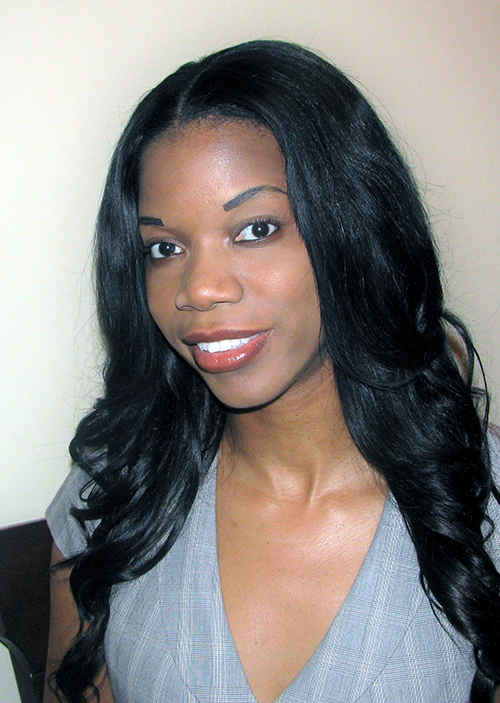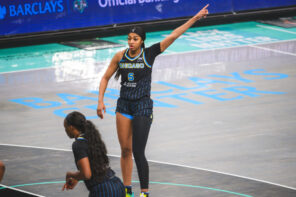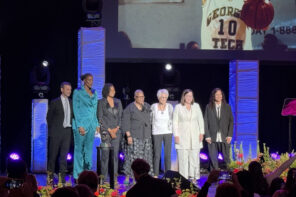Being a professional women’s basketball player comes with many challenges. Due to limited number of teams and roster spots in the WNBA, if a player is cut, she finds herself in a difficult position when trying to get back onto a team. One former WNBA player has a solution that may change the landscape for women’s professional basketball.
Former WNBA Champion Janell Burse (Lynx, Storm) has teamed up with up with a fantastic group of basketball enthusiats to launched the Women’s Minor League Basketball Association (WMLBA). With its inaugural season kicking off this summer, Janell will serve as the league’s Commissioner to ensure that the league is successful, reaches the masses, and develops a talented group of women into elite talent.
Janell took the time out of her busy schedule as commissioner, entrepreneur, and mom to chat with us about the WMLBA, the Fianal Four, and more!
BTW: How did you and your team come up with the concept behind this minor league venture?
JB: There were a lot of different reasons because everyone comes from a different background. We just knew that at the end of the day, the girls just didn’t have enough option to play after college. There are only 12 WNBA teams and 12 roster spots, so that’s 144 jobs, which honestly, aren’t all available with each team because some players have guaranteed contracts. I realized it more from playing and seeing girls who can really hoop get cut from teams for different reasons like salary caps, veteran’s minimums vs. rookie minimums. There’s all sorts of reasons why you can get cut from a team, not just because of talent. The guys have had it for a long time and have had more opportunities. It’s just time for the women to get some of the same benefits.
BTW: What do you think sets your league apart from the WNBA and international leagues, and what do you think will attract these ladies to your league?
JB: We look out for the ladies not just on the court, but off the court as well. We’re working on a lot of different relationships that will help the girls become brand ambassadors in the community, help them get some help with tuition if they didn’t finish their degree while they were a collegiate athlete. A lot of people don’t realize how hard that is. It’s almost like having two full time jobs to be honest with you to play college basketball and maintain your grades. We plan on offering a lot of different programs, such as career training, resume building, just different things that will help them transition from basketball to whatever that next step is. Whether they want to go into entrepreneurship or join corporate America, we just want to train these women to do either, or to continue playing if that option is available for them to get an overseas contract. We’re looking at the total package in terms of developing women and getting them ready for life after basketball.
BTW: Are you trying to be to the WNBA what the D-league is to the NBA, or are you setting out to be your own entity?
JB: A little bit of both to be honest with you. Obviously if a girl is super talented and having a great season, she’s going to attract the attention of the WNBA or overseas teams just because of the exposure that our league will have on television and on our streaming network, WML Network. In terms of strictly being a feeder league to the WNBA only, we just don’t put our league just in that box. We’re going to work with a lot of overseas teams to place our players over there as well.
BTW: Speaking of media, you mentioned that you have WML TV, and on of the hot-button topics surrounding the WNBA is lack of media coverage. What is WML TV, what are your expectations for it, and how do you plan to use to shift the way that women’s basketball is covered?
JB: TV is a network is designed to create that exposure that the women otherwise would not have. Once players get cut, they normally go home and work out with a trainer and wait for their agent to give them a call and say “Hey this team is interested in you.” If that time goes on longer than 6 months, the window gets smaller and smaller where these women will get signed to contracts. The purpose of WML TV is to give these women a chance to be seen. The games will be advertised, a lot of overseas general managers will be logged in and watching the, play. It’s for exposure, getting them out there to let these teams know that they’re still in shape and they can still play, or that they’ve actually gotten better. If they don’t have that exposure, they can be in the gym every day, but if no one sees it, it’s kind of like the tree that falls down in the middle of the woods. If no one is around to hear it fall, does it make a sound?
BTW: How do you go about recruiting players to be a part of your league? What are your plans for expansion?
JB: In terms of recruiting, we have free agent camps. So any women that want to play will definitely have the opportunity to come out and try out for that team. In the future, we will have a draft for those players who may go undrafted by the WNBA and don’t get the chance to go overseas. We’ll draft them, develop them, and get them signed. Our entire office was at the Final Four, and we went to the combine. We spread the word about the league, so woman are very excited that there is another option.
BTW: Is there a certain kind of talent that you are trying to attract, and did you see that in Dallas?
JB: Yea absolutely! This is was probably the best Final Four that I’ve seen in a while. IN terms of talent, we can’t just label the kind of player that we are looking for because there are a lot of players that do a lot of different things. I will say this though: from a coach’s standpoint, nobody wants a player than can do everything well. People tend to players who can do one or two things great. I would tell the girls out there to figure out what you do really well and master it.
BTW: What did you think of the Finals, and what did you take away from it?
JB: How hard they played. Not to discredit the other teams who played In the Final Four, but you can tell that they left everything on the court. I thought the media did a good jobs in terms of creating the story lines around the different players, and it made the game even that much better to watch. Also, the intensity level of Mississippi State had my mouth on the floor. Watching that entire game against UConn, we were all watching thinking that Uconn was going to pull it off. But that last shot from “Itty Bitty” (Morgan Williams), I was like “Oh my God!”
BTW: I feel that buzzer beaters are the worst! It would be one thing if she took the shot 10 seconds before. But at the buzzer?! That one burned!
JB: Exactly! If you’re getting blown out by 20 or 30, you take it on the chin like “Yea we should have played harder”. But that last second shot at the buzzer, you’re just stuck like “What do I do?” I’ve been on both sides of those games, so it’s all about how you bounce back from it. How you respond to those kind of games can make you a better player for sure. Great players have to go through that. When I saw Gabby from UConn with tears in her eyes, I though to myself that if she responds well to this loss, she’s going to be an animal next year because those are the things that make players tougher. It’s all part of mental toughness and it comes with the turf. It’s part of what makes basketball such a great sport and a great game to watch. It’s exciting and anything can happen down to the very end. So it was exciting and the best Final Four that I’ve seen in a while.
Stay tuned for Part 2, where we dive into her role as commissioner, her time in the WNBA and overseas, and life after basketball!




